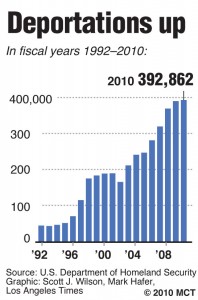
Steve Li, a 20-year-old former City College of San Francisco nursing student, is currently washing dishes in an Arizona detention facility for a dollar a day as he awaits deportation to his native Peru.
The story of how Li got there highlights California’s—as well as the nation’s—inability to find an appropriate method of handling the status of 2 million U.S.-raised children of undocumented immigrants, after Congress failed to pass the DREAM Act last September.
Li’s parents, Chinese nationals, left the People’s Republic of China for Peru in the 1980s to escape the government’s “one-child” policy. Steve, who was born in Peru, was brought to the United States at the age of 11.
Upon entering the U.S., Li’s family was issued tourist visas, which lapsed at the end of 2002. A request for asylum was denied by a judge in 2004.
Throughout that time, Li attended middle school and graduated from high school in San Francisco, reportedly unaware of his family’s status. Immigration and Customs Enforcement (ICE) officers took the family into custody on Sept. 15 and informed Li of his final deportation order to Peru, issued when he was 15, to his astonishment.
According to Li, his long absence from Peru has left him with no ties to the country—no family, no friends, no contacts at all. To make matters worse, his parents, originally scheduled to be deported to China but unable to return because they applied for political asylum, may not be able to join their son in Peru.
Li was scheduled to be deported on Nov. 14, but an eleventh-hour stay of sorts came from Senator Dianne Feinstein, who asked ICE to halt Li’s deportation as she considers introducing a bill that would allow him to stay in the country temporarily. Feinstein noted her support of the DREAM Act in a statement on the day of Li’s scheduled deportation, while House Speaker Nancy Pelosi (D-San Francisco) has vowed to reintroduce the bill during the Democratic House’s lame duck session.
Had the DREAM Act passed in the Senate last September, the situation facing Li—and undoubtedly causing concern among the estimated 2 million other children of undocumented parents—may not have come to this. The bill offers requirements for those children—such as entering the U.S. at the age 15 or younger, getting accepted to a college or university in pursuit of a bachelor’s degree, or enlisting in one of the branches of the U.S. military—would allow them a path to citizenship.
We understand being in this country illegally is a crime, and is worthy of the consequences that accompany the crime—namely, deportation to one’s country of birth. However, the children of those who choose to enter the U.S. under those circumstances cannot be held responsible for the actions of their parents. To force them “home,” especially to a country where, like Li, have no real connection, smacks of child endangerment and cruelty.
We also understand the reality that the state of California’s addiction to cheap labor depends on the same illegal aliens who are constantly decried and vilified in the media and by many in our government. What we lack in answers to our immigration problem, we tend to manifest in the same old anti-immigrant slogan-hurling, nativist posturing and flag-waving, while, quietly and grudgingly, we enjoy the economic fruits the cheap labor of undocumented immigrants bear us.
Knowing this, can we hold the children of these people accountable for something they had no hand in? Through no fault of their own, an estimated 25,000 such children in California graduate high school each year and find themselves in the same position Steve Li is in.
Under these circumstances, shouldn’t the children of undocumented immigrants be given a chance not only to succeed individually, but prove themselves able and productive members of the society they were brought into in their youth, unaware of the circumstances and potential consequences of their stay?
The California Supreme Court recently upheld California AB 540, passed in 2001, which allows students to pay resident tuition (rather than far more expensive nonresident tuition) who have attended a California high school for at least three years and graduated. Students who successfully qualify for AB 540 are not eligible for financial aid, however—they must pay out of their own pocket.
And while detractors of AB 540 say that the bill favors illegal aliens, we feel it is important to point out that, of the nearly 2,000 students that benefitted from AB 540 in the UC system last year, only 406 were the children of undocumented immigrants. The majority were students who stayed in California after their families had moved out of the state.
We applaud the Court’s decision, which, in the wake of Congress’ recent failure to pass the DREAM Act, at least demonstrates California’s sensibility and compassion when it comes to the delicate issue of what to do with these students.
By all accounts, Steve Li was a hard worker, model student and loving son, who planned to study nursing at San Francisco State University and, presumably, better his life and the lives of others. Sadly, he awaits an unknown fate in an ICE detention facility in Florence, Arizona, while his parents—who currently sport location-monitoring ankle bracelets and are deemed flight risks—remain unable to visit their son.
We’re not saying one individual is worthy of special treatment, but we hope that Sen. Feinstein and Speaker Pelosi’s actions on Li’s behalf help call greater attention to the need for comprehensive reform when it comes to the rights of innocents, regardless of their immigration status.











